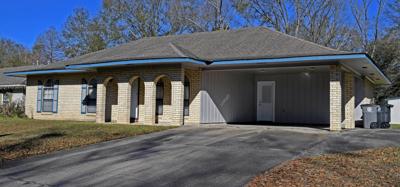Two teenage brothers arrested in Monday's Antioch Villa burglary that ended with the shooting death of a Baton Rouge great-grandmother face being charged and tried as adults in the coming months.
That means both suspects could face life sentences, though recent U.S. Supreme Court decisions have determined that people sentenced to life as juveniles must be given a chance at parole except in the most egregious cases.
The two suspects are ages 15 and 16, brothers who planned to burglarize a house on Morel Drive, according to the East Baton Rouge Sheriff's Office, which handled the investigation. Their names haven't been released because they're juveniles, but will likely become public later if prosecutors file formal charges against them and the cases proceed in adult court.
The victim was Angela Haymon, 74, who was shot to death under her carport after she heard a noise outside and went to investigate, officials have said. Haymon's husband heard the gunfire from inside their house and armed himself with his own firearm, confronting the intruder — the 15-year-old suspect — and wounding him in the process.
The teen fled and got help from a neighbor. He remains hospitalized but is expected to survive his injuries, the sheriff's office said Thursday.
He will be arrested on the following counts upon his release from the hospital: first-degree murder, attempted first-degree murder, attempted armed robbery and illegal use of a weapon. His 16-year-old brother has already been arrested on principal to first-degree murder and principal to armed robbery.
A 74-year-old woman checking out a noise on her carport was shot dead by a teenager during an attempted armed robbery, according to the East B…
The shooting occurred around 9 p.m. Monday on Morel Avenue, which is in the Antioch Villa subdivision near Tiger Bend and Antioch roads. Neighbors said Haymon and her husband were retired and had lived there for the past few years. Their house was for sale.
Attempts to reach the victims' relatives this week weren't successful, but Haymon's daughter posted publicly on her Facebook account asking friends to continue praying for her family. "I can feel the prayers lifting me up," she wrote. "This situation is very tragic and we are all trying to deal with the circumstances surrounding her passing."
Authorities have released few details about their investigation and the arrest reports aren't public record because the suspects are juveniles.
East Baton Rouge District Attorney Hillar Moore III said his office will make a charging decision in the coming weeks after reviewing evidence and meeting with the victims' family. He described it as a tragic case for everyone involved.
Moore said both defendants would be transferred to adult court if indicted on their arrest counts. Louisiana law calls for such a transfer when the defendant is 15 or older and charged with certain serious felonies, including first-degree murder.
The brother accused of being a principal to the killing would also fall under that rule and face the same possible sentences because both crimes are treated the same in that regard.
Both were scheduled to appear in juvenile court Thursday, but the hearings were pushed back because the younger one is still in the hospital and his brother's attorney requested a continuance, Moore said.
A second suspect has been arrested in connection to the death of a 74-year-old woman who confronted an intruder Monday night.
If found guilty of those charges, both defendants would face life sentences, which in Louisiana means life without parole for the vast majority of defendants. But recent U.S. Supreme Court decisions found such sentences unconstitutional for juveniles — unless a judge determines a particular defendant is among the "worst of the worst." All others become parole eligible after serving 25 years.
That same sentence would also apply if the brothers are convicted of second-degree murder instead because such convictions carry a mandatory life sentence with parole eligibility after 25 years for juveniles, meaning they have to apply for release and then go before the parole board. Life without parole for juveniles is never an option for those convicted of second-degree murder, unlike first degree.
Getting a first-degree murder conviction requires prosecutors to prove an aggravating factor, which in this case could be either the fact that the killing happens during the commission of another serious felony or that the victim was over age 65.
Such convictions allow prosecutors to also seek the death penalty against adult defendants, but that's off the table in this case after a 2005 U.S. Supreme Court decision declared life without parole the most severe sentence juvenile defendants can receive.
The court has ruled in several recent cases that sentences for juveniles should be more lenient based on scientific findings that brain development continues well into adulthood. The judges wrote in a 2012 ruling that mandatory life without parole for juveniles was unconstitutional because it failed to account for the "immaturity, impetuosity, and failure to appreciate risks and consequences" that often impact children's behavior.
"It prevents taking into account the family and home environment that surrounds him — and from which he cannot usually extricate himself — no matter how brutal or dysfunctional," the judges wrote. "It neglects the circumstances of the homicide offense, including the extent of his participation in the conduct and the way familial and peer pressures may have affected him. Indeed, it ignores that he might have been charged and convicted of a lesser offense if not for incompetencies associated with youth."
Editor's Note: This report was changed Jan. 7, 2020 to reflect the location of the victim's house is located in Antioch Villa subdivision, not Woodlawn Acres.





